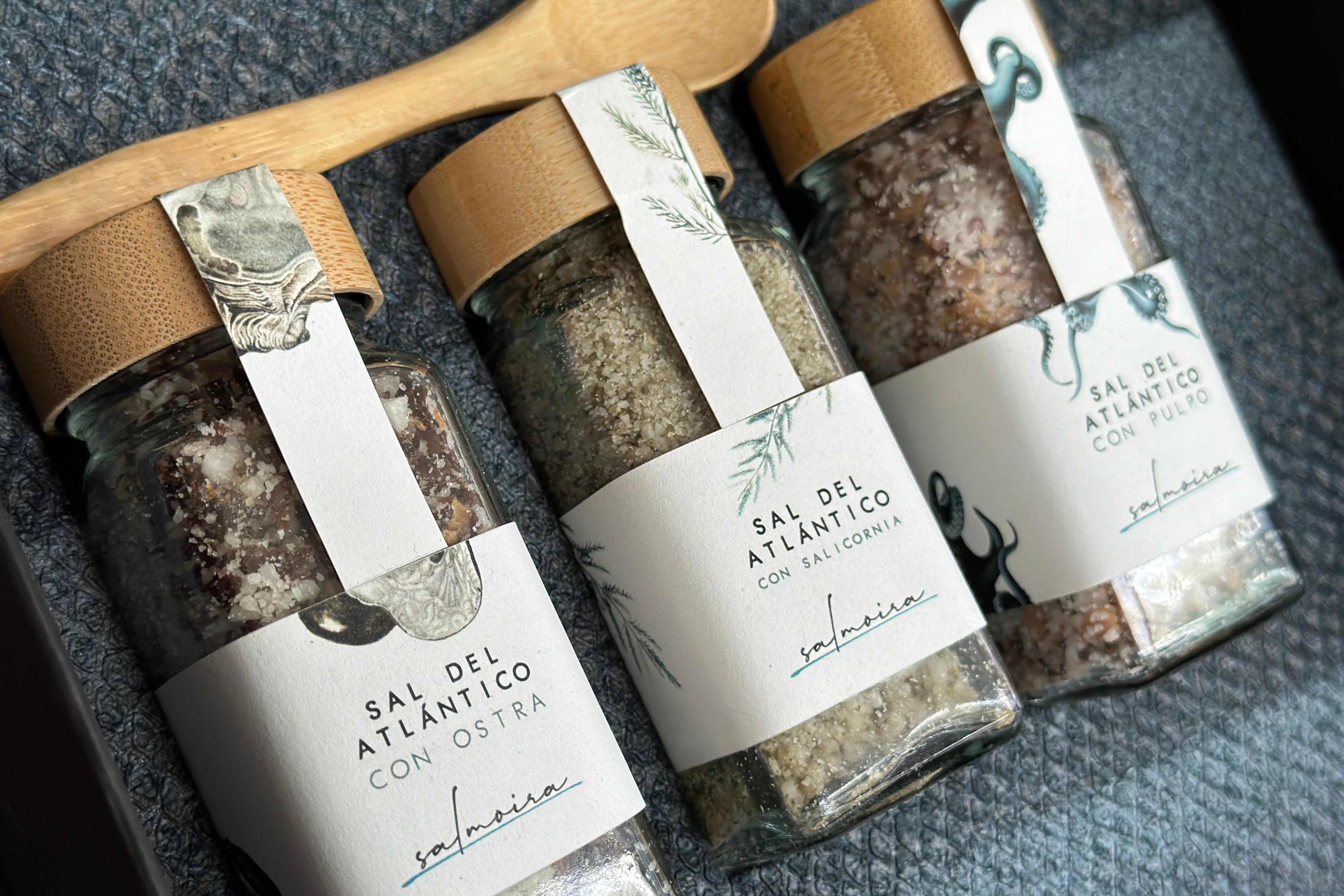
Latest information

Salmoira, recovering traditions and creating gastronomic experiences for the 21st century.
Salmoira recovers the gastronomic heritage of salted fish and shellfish from the estuaries, as well as smoked and pickled products, bringing them to the palates of the 21st century. In its R+D+i laboratory, it works on the gastronomic valorization of the industry's wastes and inshore discards.
Salmoira was born in 2022 under the auspices of Turislab, the Tourism Accelerator of the Xunta de Galicia, with a proposal linked to the heritage of salting, offering an alternative of quality tourism, seasonal, respectful and sustainable, while responding to the circular economy strategy.
"We were inspired by a couple. He, Jose Pazos, was a fisherman and she, Peregrina Pousada, was a shellfish gatherer. Now retired, he would go out with his barge to the estuary to catch some fish, which she would then salt and pickle to preserve it. After they died, we never experienced those flavors again, so we decided to recover them and bring them back to Galicia," recalls Elena Vitoria, CEO of the initiative.
Salmoira's proposal has four business lines, three of them linked to food and one to tourism. The first is oriented to the production of salted, smoked and pickled fish and seafood from the Galician Rías Gallegas. "These are ancestral methods of preservation that were for centuries the culinary identity of Galicia and that we lost abruptly due to the implementation of the canning industry in the 19th century. We investigated the response of these transformation methods with oysters, scallops, octopus from PescadeRías, turbot from aquaculture, hake from Celeiro, bonito from Burela, sardines, horse mackerel and mackerel," explains Elena Vitoria. The second is based on the gastronomic valorization of waste from the fishing industry, such as the octopus head, which is currently being used to make carpaccio, zorza, cold meat and kebab; and fishing discards such as dogfish or dogfish, which currently do not have a great value in the market. "This line of business requires a great deal of innovation and is the most valuable in terms of sustainability criteria," he explains.
Thirdly, research with coastal herbs as new gastronomic ingredients. "These herbs (not seaweed) are our aromatic herbs. Where in other places they have oregano or rosemary, in Galicia we have sea asparagus, sea fennel or coastal garlic, all edible and that can provide new gastronomic dimensions," he explains. At present, his tests are focused on salicornia. Finally, the fourth line of business is salt tourism. "It is a gastronomic tourism strategy that links the salted product with the historical and cultural heritage that the salting industry left all along the Galician coast. The creation of the workshop is strategic because of the location. We are going to produce salted fish in an artisanal way, from the Moureira neighborhood, in the basement of the Fishermen and Shellfish Fishermen's Guild of San Telmo de Pontevedra, a neuralgic point of the salt trade and salting for centuries. With the refurbishment of these premises we recover a degraded area creating the first establishment of gastronomic experiences of these new products in the city. It will be the origin of a new gastronomic tourism in the manner of wine tourism or olive oil tourism. It is a strategy of seasonal and personalized tourism".
Faced with the current challenges facing the food sector, Salmoira considers it an "absolute necessity" to reduce waste and discards from the fishing industry, producing healthy and minimally processed food. "The sea is under enormous production stress worldwide and sometimes the most sustainable thing to do is to look back and remember how we produced when we were truly sustainable," he explains.
Boosting the Business Factory Food
Salmoira was in 2023 one of the companies boosted in the Business Factory Food, the accelerator of the food sector of the Xunta de Galicia, currently continuing in the consolidation itinerary. "We entered with the clear objective of making a minimum viable product with the ideas we had. One of the biggest milestones has been to build an Innovation and Development laboratory for seafood products, where we can also carry out the 'Salt Experiences', gastronomic experiences based on salted fish and the sea. The mentoring by Nueva Pescanova has been one of the best things that has happened to us, as well as all the ecosystem and resources that BFFood has made available to us", explains Elena Vitoria.
Innovation is the DNA of this project. "Without innovation there is no evolution and now is the time to start producing with sustainability and circularity criteria in the blue economy. That is our focus. Looking ahead, his main challenge is the implementation of the Salmoira Salt Experiences. "While the food part continues its development, which is planned to go to market in the medium term, the tourism part is ready to start shining," he concludes.